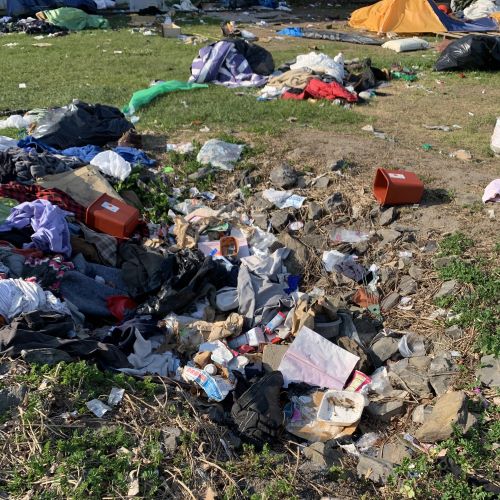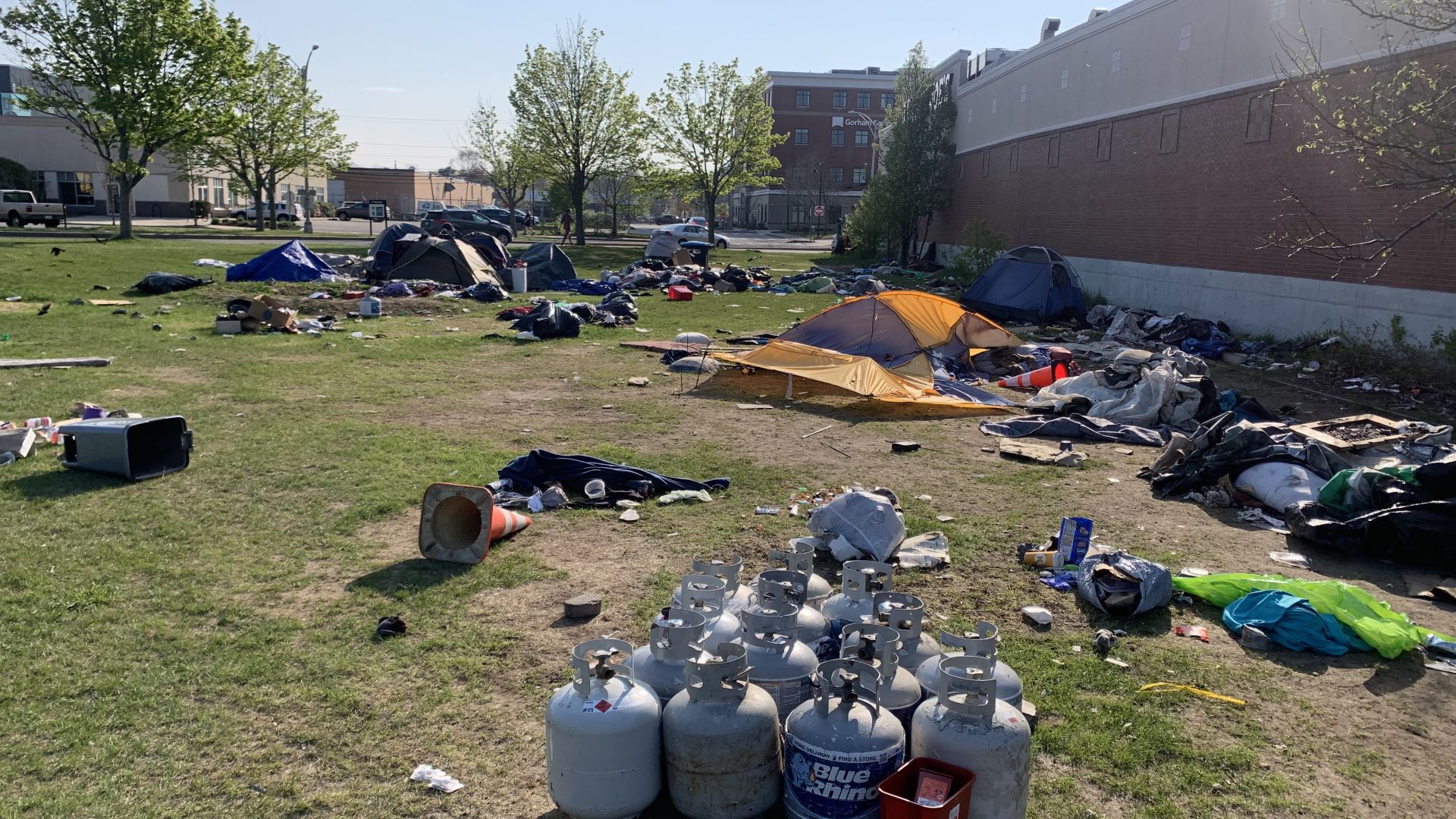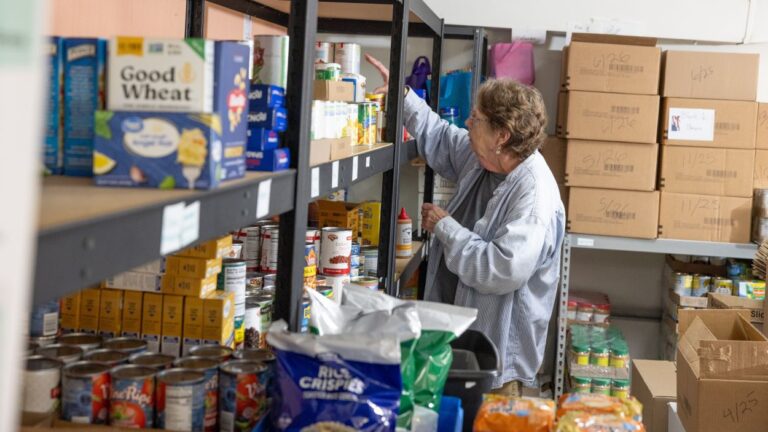On a recent afternoon in Portland’s Bayside neighborhood, the after-work crowd began to trickle into one of the area’s many craft breweries and locally owned restaurants. Teams arrived at Bayside Bowl, the upscale bowling alley with a popular rooftop bar, for the Wednesday night league. Shoppers packed the parking lots at Whole Foods and Trader Joe’s.
But a few hundred feet away on Somerset Street, sandwiched between the two grocery stories, was evidence of the mounting homeless crisis in Portland and the surrounding region. As many as 84 tents lined the Bayside Trail, a city official said Tuesday, with more than 30 new ones in just a week.
Last week, Portland officials declared the situation untenable and made plans to oust the unhoused residents. It was one of a number of steps by Portland and other cities, who say their shelters and other locations are simply full because of the related challenges of homelessness and an influx of asylum seekers, most fleeing violence in the neighboring African countries of Angola and Democratic Republic of Congo.
“This is extremely difficult. It was not a decision we made lightly,” City Manager Danielle West said Friday. “Our goal here is to be able to provide services and housing for everybody, but that has become extremely difficult.”
The city has already delayed clearing the encampment once. But in the few weeks since deciding to hold off, West said the population there grew so swiftly that “this encampment situation was of such a nature that it needs to be addressed immediately.”
Year-to-date calls for service to the area are more than double compared to last year, according to the Portland Police Department. Since March 1, Portland police have answered at least 314 calls to the Bayside area. At least a quarter of the calls were for some sort of well-being check or assistance. Police responded to 17 drug overdose calls, two unattended deaths and one stabbing, according to call data.
West said the city also received a number of complaints from businesses along Marginal Way, including concerns for people’s safety. At the May 9 meeting where the decision to clear the encampment was made, interim Police Chief Heath Gorham described several recent incidents in the area, including a man swinging a bat with a knife attached and someone defecating in a vestibule at the ConvenientMD urgent care clinic during business hours.
Parks and Recreation staff on Thursday notified unhoused residents on the Bayside Trail that they need to be out at 9 a.m. Tuesday.
On the prior afternoon, the encampment was still packed with tents, though some had apparently begun packing up as word of the city’s decision began to spread. It appeared a group of people living in a cluster of tents on the west side of the trail had left without their tents, leaving piles of clothing and a collection of propane tanks. The trail was littered with trash and other detritus. It was almost impossible to walk there without hearing the crunch of a syringe or needle being crushed underfoot.

And while people were shopping or grabbing drinks nearby, the people in the encampment were contemplating where to go next.
Shawna Correia said she’s been trying to get into Elena’s Way, a shelter run by the Preble Street nonprofit, or Freedom Place, a women’s recovery home, with no luck. Her partner lives at Huston Commons, a staffed apartment building run by Preble Street, but she can only stay there five days a month because they’re not legally married, she said. He will stay with her at the encampment sometimes so they can be together and so “his place just isn’t getting (used).”
“They wanted me to go into Elena’s Way and then transition to Huston Commons but I can’t even get into Elena’s Way,” she said. “It’s been rough because, you know, because half of us are trying to keep (the Bayside Trail clean) and half of us aren’t.”
As for what she’ll do come Tuesday, “honestly, we’re not sure. We just figured we just keep pushing … We’ll probably move our campsite somewhere else and try to just work out that way,” Correia said.
Several people Wednesday expressed frustration with the decision to clear the encampment because city officials also recognized there are no beds left to offer people without shelter. With little to no other options, most said they would find somewhere new to camp.
Many also echoed the sense of chaos and safety concerns raised by city officials, but reiterated they had nowhere else to go.
Raymond Fields said he’s been homeless for six years. He originally moved to Portland because “there were a lot of resources back then.”
“Back then it took me two weeks and I was in an apartment. Now I’m back here and it’s been six years.”
Sean, who only gave his first name, said the situation is unfair. His family has been in the city for five generations, he said, and “can’t get any help at all.”
Most nights he sleeps on his family’s boat – he’s a commercial fisherman – where his sister, also homeless, will often stay.
“The worst part about it is they’re making it – they’re criminalizing being poor. You have a mental health issue and a substance abuse problem, you’re dual diagnosed, well, the place we can house you is the Cumberland County Jail,” Sean said.
He and others said it’s difficult to find jobs with a criminal record and impossible to find affordable housing.
Kimmy Hardt, who has been homeless for over two years, said she receives Supplemental Security Income and Social Security disability benefits that add up to $1,000 a month.
“You can’t find a place in the city of Portland for that. The only way you can do that is to have, you know, someone room with you. And then you’ve got to be able to really trust them, you know, as far as paying, not bringing in trouble,” she said.
“These people, we don’t have any place to go,” Hardt said, gesturing to the encampment. “There’s no more … there’s no place we can camp. They throw us out of every place.”
The city is housing upwards of 1,200 people a night. The city’s Homeless Services Center, a 208-bed shelter in the Riverton neighborhood, opened in late March and reached capacity on the first day. And the Portland Expo, a basketball arena that served as a temporary shelter for asylum seekers in 2019, and as an emergency shelter during the early days of the pandemic in 2020, reopened again in April to house nearly 300 asylum seekers. It, too, filled up almost immediately.
“We’re pushed to the brink,” West, the city manager, said.
West acknowledges that to some, including city councilors who spoke against clearing the encampment at the May 9 meeting, this latest move feels like kicking the can down the road.
The city cleared an encampment of unhoused people in Deering Oaks Park last October, then another tent city popped up on the Bayside Trail a few months later. Asked about the optics and the possibility another encampment could pop up after Bayside is cleared, West said, “honestly, there is no response.”
“That is the accurate description of what happened. Deering Oaks was smaller and it was a different situation. But that is the issue. And so this is (a) much bigger issue that we have to address and find ways to deal with. And we recognize that, as a leadership team at the city, and I think the City Council does as well.”
But, West said, “we need a lot of help trying to figure it out.”
As the unsheltered population in Portland has swelled, so has the number of asylum seekers. More than 1,000 have arrived this year, with more arriving nearly every day. While the needs are different for many of them, at the end of the day they also need a bed.
The situation is unprecedented for both Portland and the state, said Cullen Ryan, the executive director of Community Housing of Maine. In the past, Portland has been able to handle its homeless population fairly well because most people only needed shelter for a few days or weeks at a time.
But homeless shelters and general assistance programs are not set up as long-term solutions. As more people find themselves chronically homeless or, in the case of asylum seekers, unable to work for at least 180 days after arriving, “Portland’s overwhelmed,” Ryan said.
“The city is desperate.”
Next week, a “technical assistance team” from the U.S. Department of Housing and Urban Development is set to arrive in Portland.
A similar team helped Bangor officials clear a number of encampments earlier this year. According to the Bangor Daily News, that work was done over several months and in coordination with 10 local and state agencies. The last encampment, on Valley Avenue, was cleared in April. But since then, Bangor police have responded to more than 50 vagrancy complaints, the newspaper reported.
In Sanford, about 35 miles southwest of Portland, officials were dealing with the arrival of as many as 100 asylum seekers, apparently driven there by someone who concluded the city of 22,000 was able to offer more resources than Portland could at that moment.
And last week, Gov. Janet Mills announced her updated budget proposal, which includes $80 million for affordable housing and a $12 million infusion to the Emergency Housing Relief Fund. Towns are also lobbying Augusta for increased state reimbursement for general assistance, which are municipal-run programs to help individuals and families meet basic needs.







